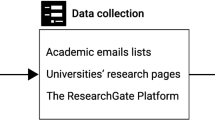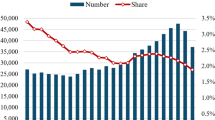Abstract
This paper analyses the inbreeding phenomena in Portuguese public universities. Inbreeding is defined as the recruitment of academics by the same institution that awarded their PhDs. Focusing on 1,217 PhD-holding Portuguese academics, belonging to four public universities and to six disciplinary areas, inbreeding is analysed in order to understand whether it might be influenced by the age of the institution and by how long ago the disciplinary area was established in a particular institution. Although a higher level of inbreeding was observed in older universities and in some of the longer established disciplinary areas, suggesting that institutional and disciplinary age play a role, it is possible to conclude that the inbreeding phenomenon is quite complex, and is influenced by other factors such as the disciplinary areas’ core academic values and practices.
Similar content being viewed by others
References
Baldi, S. (1994). Changes in the stratification structure of Sociology, 1964–1992. The American Sociologist, 25, 28–43. Retrieved from: http://www.springer.com/social+sciences/journal/12108.
Becher, T., & Trowler, P. (2001). Academic tribes and territories. Buckingham: The Society for Research into Higher Education and Open University Press.
Berelson, B. (1960). Graduate education in the United States. New York: McGraw-Hill.
Bourdieu, P. (1984). Homo academicus. Paris: Les Éditions de Minuit.
Bourdieu, P. (2003). Firing back: Against the tyranny of the market 2. New York: New York Press.
Burris, V. (2004). The academic caste system: Prestige hierarchies in PhD exchange networks. American Sociological Review, 69(2), 239–264.
Carvalho, T., Cardoso, S., and Sousa, S. (2014). Changes in the institutional context and academic profession—a case from Portugal. In K. Prpic, I. van der Weijden, N. Asheulova (Eds.), (Re)Searching scientific careers. St. Petersburg: IHST/RAS/SSTN-ESA.
Carvalho, T. (2012). Shaping the ‘new’ academic profession. Tensions and contradictions in the professionalisation of academics. In G. Neave & A. Amaral (Eds.), Higher Education in Portugal 1974–2009. A Nation, a generation (pp. 329–352). Dordrecht: Springer.
Carvalho, T., & Santiago, R. (2008). Gender differences on research: Perceptions and use of academic time. Tertiary Education and Management, 14(4), 317–330. Retrieved from: http://www.tandfonline.com/toc/rtem20/current.
Clark, B. (1983). The higher education system. Academic organization in cross-national perspective. California: University of California Press.
Cruz-Castro, L., & Sanz-Menéndez, L. (2010). Mobility versus Job stability: Assessing tenure and productivity outcomes. Research Policy, 39(2010), 27–38. Retrieved from: http://www.sciencedirect.com/science/journal/00487333.
De Boer, H., & Stensaker, B. (2007). An internal representative system: The democratic vision. In P. Maassen & J. Olsen (Eds.), University dynamics and European integration (pp. 99–118). Dordrecht: Springer.
DGEEC (2012). http://www.dgeec.mec.pt/np4/Estat_Doutoramentos/.
DiMaggio, P. J., & Powell, W. W. (Eds.). (1991). The new institutionalism in organizational analysis (Vol. 17). Chicago: University of Chicago Press.
DiMaggio, P. J., & Powell, W. W. (1983). The iron cage revisited: Institutional isomorphism and collective rationality in organizational fields. American sociological review, 48(2), 147–160.
Enders, J. (2006). The academic profession. In J. J. F. Forest & P. H. Altbach (Eds.), International handbook of higher education (pp. 5–22). Dordrecht: Springer.
Horta, H. (2008). On improving the university research base: The Technical University of Lisbon case in perspective. Higher Education Policy, 21, 123–146.
Horta, H. (2013). Deepening our understanding of academic inbreeding effects on research information exchange and scientific output: new insights for academic based research. Higher Education, 65, 487–510. doi:10.1007/s10734-012-9559-7.
Horta, H., Sato, M., & Yonezawa, A. (2011). Academic inbreeding: Exploring its characteristics and rationale in Japanese universities using a qualitative perspective Asia Pacific. Educational Review, 12, 35–44. doi:10.1007/s12564-010-9126-9.
Horta, H., Veloso, F. M., & Grediaga, R. (2010). Navel gazing: Academic inbreeding and scientific productivity. Management Science, 56(3), 414–429. Retrieved from: http://mansci.journal.informs.org/content/current.
Heitor, M., Horta, H., & Mendonça, J. (2014). Developing human capital and research capacity: Science policies promoting brain gain. Technological Forecasting and Social Change, 82, 6–22.
INDEZ (2010). Pessoal existente em instituições de ensino superior público [Public higher education institutions academic staff]. Direcção de Serviços de Suporte à Rede do Ensino Superior. V1.3 (Outubro 2011). Lisboa: Direcção-Geral do Ensino Superior. Retrieved from: http://www.dges.mctes.pt/NR/rdonlyres/99CEE606-990E−4CB4-A8AC-ACFAF7AAD58B/5817/EstudoINDEZ2010V13.pdf.
Jackson, C., & Tinkler, P. (2000). The PhD examination: An exercise in community-building and gatekeeping? In I. McNay (Ed.), Higher education and its communities (pp. 38–50). Buckingham: Society for Research into Higher Education/Open University Press.
Kogan, M., & Hanney, S. (2000). Reforming higher education. London: Jessica Kingsley Publishers.
Larsen, I. (2010). From democracy to management oriented leadership? The manager-academic in Norwegian higher education. In L. Meek, L., Goedegebuure, R. Santiago, T. Carvalho (Eds.), The changing dynamics of higher education middle management (pp. 145–164). Series: Higher Education Dynamics, Vol. 28. London: Springer.
Marginson, S., & Considin, M. (2000). The enterprise university. Power, governance and reinvention in Australia. Cambridge: The Cambridge University Press.
Mintzberg, H. (1994). Le management, voyage au centre des organisations. Paris: Les Éditions D’Organisation.
Musselin, C. (2004). Towards a European academic labour market? Some lessons drawn from empirical studies on academic mobility. Higher Education, 48, 55–78. Retrieved from: http://www.springer.com/education+%26+language/higher+education/journal/10734.
Padilla, L. E. (2007). How has Mexican faculty been trained? A national perspective and a case study. Higher Education, 56, 167–183. Retrieved from: http://www.springer.com/education+%26+language/higher+education/journal/10734.
Pelz, D. C., & Andrews, F. M. (1966). Scientists in organizations. New York: Wiley.
Santiago, R., & Carvalho, T. (2008) Academics in a new work environment: The impact of New Public Management on work conditions. Higher Education Quarterly, 62(3), 204–223. Retrieved from: http://onlinelibrary.wiley.com/journal/10.1111/%28ISSN%291468-2273/issues.
Santibañez, L., Vernez, G., & Razquin, P. (2005). Education in Mexico—challenges and opportunities. Santa Monica: Rand Corporation.
Scott, R. (2001). Institutions and organisations. London: Sage.
Scott, R. (2003). Institutional carriers: reviewing modes of transporting ideas over time and space and considering their consequences. Industrial and Corporate Change, 12(4), 879–894.
Weber, M. (1995). Economie et sociétè. Les catégories de la sociologie, Vol. 1. Paris: Pocket.
Weber, M. (1999). Economia e sociedade [Economy and society] (Vol. 2). Brasília: Editora Universidade de Brasília.
Yamanoi, A. (2005). The academic marketplace in Japan: Inbreeding, grades and organization at research universities. Higher Education, 3, 93–114. Retrieved from: http://www.springer.com/education+%26+language/higher+education/journal/10734.
Legislation
Decree Law 448/1979.
Decree Law 205/2009.
Law 62/2007.
Author information
Authors and Affiliations
Corresponding author
Rights and permissions
About this article
Cite this article
Tavares, O., Cardoso, S., Carvalho, T. et al. Academic inbreeding in the Portuguese academia. High Educ 69, 991–1006 (2015). https://doi.org/10.1007/s10734-014-9818-x
Published:
Issue Date:
DOI: https://doi.org/10.1007/s10734-014-9818-x




